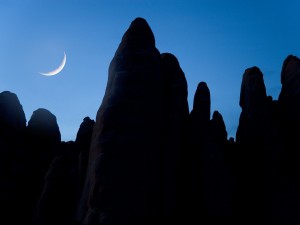Category Archives: English
Eid ul-Fitr as Explained by Hazrat Shaykh Abdul Qadir Jilani (1077-1166)
The Festival of Breaking Fast after Ramadan came to be called Eid for the simple reason that Allah Almighty restores joy and happiness to His servants on their day of festive celebration. The Arabic noun “Eid†or “Id†is derived from a three consonant root which conveys the basic notion of “returningâ€.
Many other explanations have been suggested, including the following sayings:
“It came to be called Eid for the simple reason that it contains the benefits of goodness bestowed by Allah Almighty, and the favors of generous grace conferred by Him upon His servant.â€
“The explanation is that the servant returns at that time to humble entreaty and weeping, and the Lord (Almighty and Glorious is He) returns at that time to the giving of presents and the granting of gifts.â€
“When people celebrate the Eid, it means that they have returned to their previous condition from the state of purity experienced while keeping the fast.â€
“It signifies that they have returned from obeying Allah Almighty directly to obeying the Messenger (Peace Be Upon Him) (this Arabic calligraphy means ‘May Allah bless the Holy Prophet (Peace Be Upon Him) and grant Him peace’), from the religious practice that is strictly obligatory to that which is customary but not compulsory and from the Fast of Ramadan to the fast of six days in the month of Shawwal.â€
“It came to be called Eid for the simple reason that the believers are told at that time: ‘Return to your dwelling places, knowing that you have been granted forgiveness!’â€
“It came to be called Eid because it is an occasion for remembering the promise and the threat, the Day of requital and superabundance, the Day of emancipation for the bondmaids and the male slaves, the approach of the Lord of Truth to His creatures near and far, and the reality of contrition and repentance from the feeble servant to the One who is All-Forgiving and Ever-Loving.â€
It was Wahb ibn Munabbih (may Allah have mercy on him) who said:
“Allah created the Garden of Paradise on the Day of Breaking the Fast; He planted the Tree of Bliss (Tooba) on the Day of Breaking the Fast; He chose Angel Gabriel (peace be upon him) as the conveyer of inspiration on the Day of Breaking the Fast; and the sorcerers found forgiveness on the Day of Breaking the Fast.â€
The Prophet (Peace Be Upon Him) is reported as having said:
“When the Day of Breaking the Fast comes around, and the people emerge from their homes to pray in the open space near the burial ground, Allah Exalted in He, will take notice of them, and He will say: ‘My servants, for My sake you have kept the fast, and for My sake you have performed the prayers. Now take your leave, knowing that you have been granted forgiveness!’â€
The following Hadeeth of the Holy Prophet (Peace Be Upon Him) is one of those reported on the authority of Hazrat Ibn Abbas (may Allah be pleased with him and his father):
“When the month of Ramadan is over, and the Night of Breaking the Fast has arrived, that night is called the Night of Prize. Then, in the early morning of the Day of Breaking the Fast, Allah Most Exalted is He, will send His angels forth to visit all the towns and cities on the earth below. Once they have made their descent, they will position themselves at the entrances to all the streets and alleys. There, in a voice that is audible to every being created by Allah Most Exalted is He, apart from the jinn and humankind, they will issue a proclamation, saying: ‘O Community of Muhammad (Peace Be Upon Him), come forth into the presence of a Noble and Generous Lord, who will grant you gifts in abundance, and forgive your terrible sin!’
Then, when the believers have emerged and presented themselves at their place of prayer, Allah Most Exalted is He, will say to His angels: ‘O My angels!’ They will respond to His call by saying: ‘We wait intent upon Your service, time and time again, and upon aiding Your cause, time and time again (labbaika wa sa’daik)!’ Then He will say to them: ‘What is the recompense of the hired laborer, once he has done his job?’ The angels will reply: ‘Our God and our Master and our Lord, You will pay him his wages in full!’ So the All-Majestic One will say: ‘I now call upon you to bear witness, O My angels, that I have conferred My acceptance and My forgiveness, as the reward for their fasting and the night vigil during the month of Ramadan.’ Then He will say: ‘O My human servants, put your requests to Me now, for this I swear, by My Might and My Majesty: You will not ask me this day, in this gathering of yours, for anything connected with your life hereafter, without My granting it to you; nor for anything connected with your life in this lower world, without my attending to your need. By My Might and My Majesty, I will surely condone the false steps you make, as long as you are consciously alert in the effort to avoid incurring My displeasure. By My Might and My Majesty, I will not put you to shame, nor will I expose you to disgrace amongst those who are faithfully committed to observing the statutes (hudood). Now you may depart, knowing that you have been forgiven. You have won My approval, and I am well pleased with you.’
The angels will then be very happy, as they welcome the good news of all that Allah Almighty and Glorious is He, will bestow upon this Community, when its members break the fast they have kept through the month of Ramadan.â€
The above excerpt was taken from Al-Ghunya li-Taalibi Tareeq al-Haqq by Shaykh Abdul Qadir Jilani (may Allah be pleased with him) translated from the Arabic by Haaji Muhtar Holland into Sufficient Provision for Seekers of the Path of Truth. (Al-Baz Publishing, Inc., Florida, 1997)
Shaykh Abdul Qadir Jilani (may Allah be pleased with him) is one of the greatest scholars and Saints of the Islamic tradition, and fountainhead of the Qadri Spiritual Order. He was born in the Iranian district of Gilan, south of the Caspian Sea, in 470 Hijri (1077 CE). Having lived a life of extreme piety, sacrifice, service, and devotion to Allah Almighty and His Messenger (Peace Be Upon Him), he passed onto the Realm of Divine Beatitude on the 11th of Rabi-uth-Thani, 561 Hijri (1166 CE). He rests in the city of Baghdad, Iraq. His blessed mausoleum is a place of pious visitation from devotees around the world.
Prayers for the 25th Night of Ramadan
The Beloved Prophet (prayers and peace of Allah be upon him) has said:
“Anyone, man or woman from my umma (community) who want to benefit from the light of my grave then he (or she) should perform worship with great intensity on each Laylat ul-Qadr (last 10 odd nights) , so that Allah The Most Exalted may wipe the person’s sins away and replace them with good deeds.â€
The worship on Laylat ul-Qadr is better and more powerful than worship of 70 (seventy) thousand nights.
The 3rd of Laylat ul-Qadr (25th Night):
The prayer can be done in one of three ways:
- Perform 4 cycles of prayer with 2 salam. In each cycle, after reading Surah Al-Fatiha,  read Surah Qadr 1 time  and Surah Ikhlas 5 times. After the salam, read Kalma Tayyibbah (i.e. say Laa ilaaha illa Allahu Muhammadur Rasoolullaah) 100 (hundred) times. Insha Allah, Allah The Most Exalted will grant numerous benefits for this prayer.
- Perform 4 cycles of prayer with 2 salam. In each cycle, after reading Surah Al-Fatiha,  read Surah Qadr 3 times  and Surah Ikhlas 3 times. After the salam, read Asthaghfar 70 times. This prayer is very effective for having sins forgiven.
- Perform 2 cycles of prayer. In each cycle, after reading Surah Al-Fatiha,  read Surah Qadr 1 time  and Surah Ikhlas 15 times. After  the salam, read Kalma   Shahadat (i.e. say ash-hadu al laa ilaaha illa Allahu wahadhu laa shareeka lahu wa  ash-hadu anna  Muhammadan  abduhu wa  rasooluhu)  70 times.  This prayer is  for  the protection  from  the torment  of the grave.
Insha Allah, this  prayer will bring in a reward  of 70 times higher than any regular (nafl) prayer. Any one who makes a plea to Allah The Most Exalted, insha Allah it will be answered.
Also, read  Surah Dukhan (Al-Quran, chapter 44) on this night. Insha Allah, by reading this surah, it saves one from the torment of the grave. Also, one should read Surah Fath (Al- Quran, chapter 48) 7 times.  It  is  effective  for  any desire  or plea one may have.
The preceding text is taken from the booklet of Prof. Dr. Muhammad Ahmed Qadri Ramadan:Â The Month of Patience, Empathy, and Self-Purification.
For the entire text, visit:
https://www.iecrcna.org/site/1115/ramadan-the-month-of-patience-empathy-and-self-purification/










